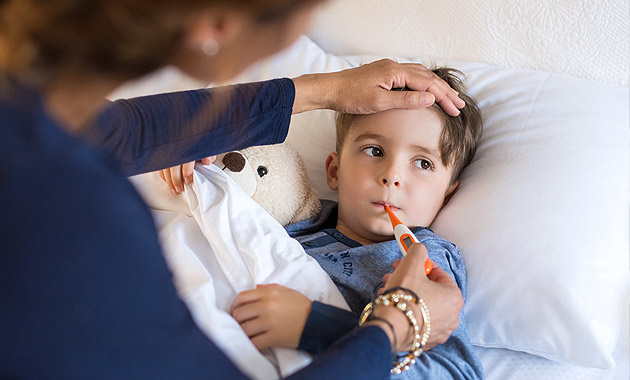Attending to a sick child can be worrisome for parents. Episodes of high temperature are common in children due to their developing immunity. It is impossible to prevent a fever during these early years of life. However, parents need to understand that most fevers are usually not life-threatening and are nothing but the body’s defense mechanisms in response to any kind of infections.
NORMAL TEMPERATURE IN CHILDREN
-The normal body temperature is about 98.6 °F.
-Temperatures above 100.4 °F signal fever. Most fevers are viral and are not serious in nature.
-Common signs of fever include warm skin, sweating,fussy and irritable child, flushed skin and loss of appetite. It may be accompanied by vomiting, sore throat, loose stools, runny nose and cough.
THINGS TO DO IN CASE OF FEVER:
1 . Administer plenty of fluids to the child to prevent dehydration. As the body develops high temperature, it loses water.
2 . Administer paracetamol as per your child’s weight as directed by your physician.
3 . Do not use aspirin.
4 . Do not put extra clothing or cover up your child. Use light clothing on your child and let the body cool.
5 . Do not force feed your child. Adequate amount of fluids (2-3lts) is enough to keep the child hydrated and maintain urine output.
6 . To bring the temperature down quickly, do fomentation using a cool, wet cloth on the forehead.
7 . You may also keep the child under a fan to help in bringing down the temperature.
8 . You can give your child a bath with lukewarm water to lower his/her body temperature.
9 . If a child who is 3 months or younger has temperature higher than 100.4 °F (38°C), seek medical care immediately.
10 . An older child may require immediate medical supervision in case of the following:
- Persistent fever for more than five days
- Rash
- Vomiting and diarrhea
- Dehydration with less urination than normal. Child appears irritable, dull, and drowsy
- Excessive and inconsolable crying
- Any other known medical conditions exist simultaneously
Avoid sending your child to school or daycare until the child’s temperature is normal at least for a duration of 24 hours.Ensure your child gets enough rest and sleep.While preventing a fever is difficult, following these simple tips, you can ensure your child’s health doesn’t deteriorate till medical help is available and will often take care of the minor viral fever or flu that occur at the change of seasons. Stay Healthy, Stay Happy!
